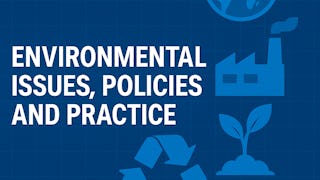- Browse
- Climate Change
Results for "climate change"
 Status: Free TrialFree Trial
Status: Free TrialFree TrialSkills you'll gain: Real-Time Operating Systems, Embedded Systems, Internet Of Things, System Requirements, Software Engineering, System Testing, Software Development, Verification And Validation, Cloud Infrastructure, Integration Testing, Performance Testing, Systems Integration, System Implementation, Requirements Analysis, Innovation, Algorithms
4.6·Rating, 4.6 out of 5 stars69 reviewsAdvanced · Course · 1 - 4 Weeks
 Status: FreeFreeU
Status: FreeFreeUUniversity of Alberta
Skills you'll gain: International Relations, Socioeconomics, Cultural Sensitivity, Global Marketing, Cultural Diversity, Natural Resource Management, World History, Culture, Sustainable Development, Economic Development, Economics, Environment and Resource Management, Governance
4.6·Rating, 4.6 out of 5 stars84 reviewsBeginner · Course · 1 - 4 Weeks
 Status: Free TrialFree TrialJ
Status: Free TrialFree TrialJJohns Hopkins University
Skills you'll gain: Applied Mathematics, Estimation, Numerical Analysis, Calculus, Engineering Calculations, Mathematical Modeling, Operations Research, Derivatives, Algebra
4.7·Rating, 4.7 out of 5 stars59 reviewsIntermediate · Course · 1 - 3 Months
 Status: Free TrialFree TrialS
Status: Free TrialFree TrialSSaïd Business School, University of Oxford
Skills you'll gain: Environmental Social And Corporate Governance (ESG), Corporate Sustainability, Stakeholder Engagement, Sustainable Business, Governance, Business Metrics, Sustainable Development, Sustainability Reporting, Business Reporting, Stakeholder Management, Sustainability Standards, Stakeholder Analysis, Performance Measurement, Business Ethics, Environmental Management Systems, Investment Management, Natural Resource Management, Investments, Risk Management, Diversity and Inclusion
4.6·Rating, 4.6 out of 5 stars54 reviewsBeginner · Course · 1 - 4 Weeks
 Status: NewNewStatus: PreviewPreviewO
Status: NewNewStatus: PreviewPreviewOO.P. Jindal Global University
Skills you'll gain: Environmental Laws, Environment, Environmental Policy, Sustainable Development, Environmental Issue, Sanitation, Hazard Analysis, Public Health, Water Resources, Environmental Monitoring, Risk Analysis, Epidemiology, Water Quality, Pollution Prevention, Climate Change Adaptation
Build toward a degree
Beginner · Course · 1 - 3 Months
 Status: Free TrialFree TrialQ
Status: Free TrialFree TrialQQueen Mary University of London
Skills you'll gain: Stakeholder Management, Organizational Change, Time Management, Organizational Effectiveness, Organizational Leadership, Leadership and Management, Organizational Structure, Business Leadership, Team Leadership, Leadership, Executive Presence, Influencing, Personal Development
4.6·Rating, 4.6 out of 5 stars120 reviewsAdvanced · Course · 1 - 4 Weeks
 Status: PreviewPreview
Status: PreviewPreviewSkills you'll gain: Staff Management, Collaborative Software, Organizational Change, Change Management, Google Cloud Platform, Cloud Computing, Business Transformation, Workforce Development, Innovation, Employee Engagement, Communication
4.7·Rating, 4.7 out of 5 stars9 reviewsBeginner · Course · 1 - 4 Weeks
 Status: Free TrialFree TrialA
Status: Free TrialFree TrialAAmerican Psychological Association
Skills you'll gain: Self-Awareness, Relationship Building, Personal Development, Psychology, Relationship Management, Self-Motivation, Emotional Intelligence, Cultural Diversity, Behavior Management, Human Relations Movement, Decision Making, Goal Setting, Sociology, Social Sciences, Interpersonal Communications, Cognitive flexibility, Critical Thinking, Mindfulness, Research, Case Studies
4.7·Rating, 4.7 out of 5 stars45 reviewsBeginner · Specialization · 3 - 6 Months
 Status: PreviewPreviewU
Status: PreviewPreviewUUniversiteit Leiden
Skills you'll gain: Care Management, Data Sharing, Care Coordination, Value-Based Care, Health Promotion, Patient-centered Care, Patient Education And Counseling, Preventative Care, Community Health, Spatial Analysis, Chronic Diseases, Geographic Information Systems, Continuous Quality Improvement (CQI), Risk Analysis
4.9·Rating, 4.9 out of 5 stars49 reviewsIntermediate · Course · 1 - 3 Months
 Status: PreviewPreviewU
Status: PreviewPreviewUUniversidad Austral
Skills you'll gain: Organizational Structure, Organizational Change, Agile Methodology, Culture Transformation, Business Transformation, Agile Project Management, Sprint Retrospectives, Sprint Planning, Organizational Leadership, Strategic Leadership, Continuous Improvement Process, Complex Problem Solving
4.7·Rating, 4.7 out of 5 stars143 reviewsBeginner · Course · 1 - 4 Weeks
 Status: Free TrialFree TrialD
Status: Free TrialFree TrialDDuke University
Skills you'll gain: Pandas (Python Package), Version Control, Git (Version Control System), Data Manipulation, Software Development Tools, Development Environment, Data Structures, Python Programming, Data Analysis Software, NumPy, Virtual Environment
4.6·Rating, 4.6 out of 5 stars267 reviewsBeginner · Course · 1 - 4 Weeks
 Status: Free TrialFree TrialU
Status: Free TrialFree TrialUUniversity of Colorado Boulder
Skills you'll gain: Sustainable Business, Sustainability Reporting, Corporate Sustainability, Environmental Social And Corporate Governance (ESG), Sustainable Development, Sustainable Systems, Sustainability Standards, Business Reporting, Annual Reports, Strategic Leadership, Leadership, Social Impact, Organizational Structure, Climate Change Mitigation, Marketing Management, Accounting, Marketing, Communication
Build toward a degree
4.9·Rating, 4.9 out of 5 stars16 reviewsIntermediate · Course · 1 - 3 Months
In summary, here are 10 of our most popular climate change courses
- Capstone: Autonomous Runway Detection for IoT: 28DIGITAL
- Arctic Economy : University of Alberta
- Calculus through Data & Modeling: Applying Differentiation: Johns Hopkins University
- Foundations of Sustainability and ESG: Saïd Business School, University of Oxford
- Environmental Issues, Policies, and Practice: O.P. Jindal Global University
- Getting Started with Leadership: Queen Mary University of London
- Managing Change when Moving to Google Cloud en Español: Google Cloud
- Discover Yourself, Build Relationships, and Navigate Groups: American Psychological Association
- Population Health: Panel Management Next Level: Universiteit Leiden
- Modalidades organizacionales ágiles en base a la Metodología Scrum: Universidad Austral










